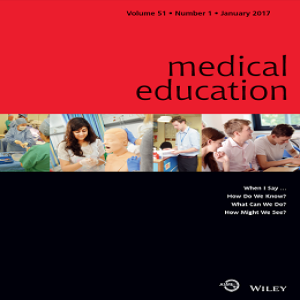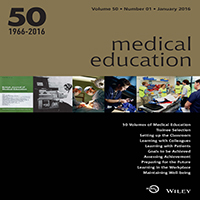Episodes

Tuesday Sep 28, 2021
Tuesday Sep 28, 2021
The authors present a model for the remediation of practising doctors based on an extensive realist review of the literature.
Read the accompanying article to this audio paper: Optimising the delivery of remediation programmes for doctors: A realist review.

Tuesday Sep 28, 2021
Tuesday Sep 28, 2021
In this three-year, multi-method, study the authors uncover six key challenges (along with plausible solutions) that competence committees grapple with as they move from concept to implementation.
Read the accompanying article to this audio paper: Competence committees: The steep climb from concept to implementation.

Wednesday Sep 01, 2021
Wednesday Sep 01, 2021
Effectively utilising judgement in assessment requires understanding what is deemed ‘fair’. Here the authors demonstrate the multifaceted nature of this construct along with its complexity and contextual nature.
Read the accompanying article to this podcast: Making it fair: Learners’ and assessors’ perspectives of the attributes of fair judgement.

Wednesday Sep 01, 2021
Wednesday Sep 01, 2021
This scoping review outlines the motivations underlying why Entrustable Professional Activities are rapidly gaining popularity and acceptance in entry-level medicine, nursing, pharmacy and allied health.
Read the accompanying article to this podcast: Entrustable professional activities in entry-level health professional education: A scoping review.

Monday Aug 16, 2021
Monday Aug 16, 2021
The authors explore what is known about identity development within Longitudinal Integrated Clerkships, suggesting they manifest their benefits and influence identity through continuity, relationships and responsibility.
Read the accompanying article to this audio paper: Professional identity formation within longitudinal integrated clerkships: A scoping review.

Monday Aug 16, 2021
Monday Aug 16, 2021
Broks et al show that increased Year-1 performance standards improve Year-1 completion rates, but not Bachelor completion rates. An intersectional approach, however, reveals differential effects for subgroups of students.
Read the accompanying article to this audio paper: Effects of raising the bar on medical student study progress: An intersectional approach.

Monday Aug 02, 2021
Monday Aug 02, 2021
van der Meer et al. provide a valuable conceptual framework with practical guidelines regarding how to build a Sense of Community in online medical pre-clerkship education.
Read the accompanying article to this podcast: Practical guidelines to build Sense of Community in online medical education.

Monday Aug 02, 2021
Monday Aug 02, 2021
When student use of open-resources is novel a disconnect emerges as standard setting panelists perceive a need to increase the pass-mark while the availability of resources actually slows student responding, resulting in no effect on score.
Read the accompanying article to this podcast: Randomised controlled trial of students access to resources in an examination.

Wednesday Jul 14, 2021
Wednesday Jul 14, 2021
The authors critically appraise “Love and Breakup Letter” methodology, illustrating its value to medical education research through illustrative case studies.
Read the accompanying article to this audio paper: Love and breakup letter methodology: A new research technique for medical education.

Wednesday Jul 14, 2021
Wednesday Jul 14, 2021
Exploring the nature of medical students' moral dilemmas in clinical practice, Ribeiro et al. expose how memorable, multidimensional, impactful, and emotionally intense these experiences are.
Read the accompanying article to this audio paper: ‘I found myself a despicable being!’: Medical students face disturbing moral dilemmas.

